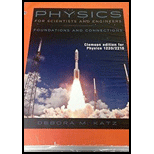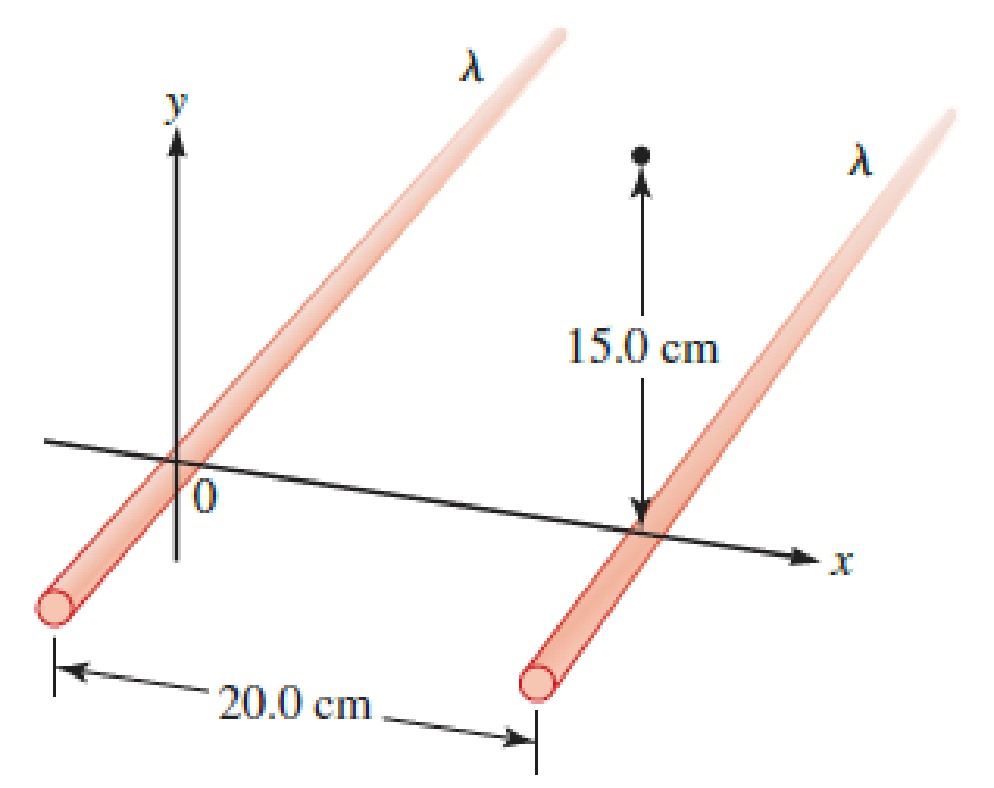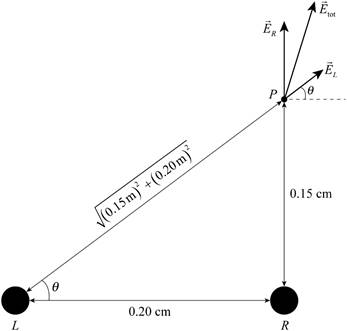
Concept explainers
Two long, thin rods each have linear charge density λ = 6.0 μC/m and lie parallel to each other, separated by 20.0 cm as shown in Figure P25.32. Determine the magnitude and direction of the net electric field at point P, a distance of 15.0 cm directly above the right rod.

Figure P25.32
The magnitude and direction of the net electric field at point
Answer to Problem 32PQ
The magnitude and direction of the net electric field at point
Explanation of Solution
The following figure gives the components of the electric field with direction.

Write the expression for the electric field due to the right rod.
Here,
Write the expression for the electric field due to the left rod.
Here,
Write the expression for the angle
Here,
Write the expression for the vector field of the left rod.
Write the expression for total electric field.
Write the expression for the magnitude of the electric field.
Here,
Write the expression for the direction of the electric field.
Conclusion:
Substitute
Substitute
Substitute
Substitute
Substitute
Substitute
Substitute
Therefore, the magnitude and direction of the net electric field at point
Want to see more full solutions like this?
Chapter 25 Solutions
Physics for Scientists and Engineers: Foundations and Connections
- A very large, flat slab has uniform volume charge density and thickness 2t. A side view of the cross section is shown in Figure P25.51. a. Find an expression for the magnitude of the electric field inside the slab at a distance x from the center. b. If = 2.00 C/m3 and 2t = 8.00 cm, calculate the magnitude of the electric field at x = 300 FIGURE P25.41 Problems 51 and 52.arrow_forwardA solid, insulating sphere of radius a has a uniform charge density throughout its volume and a total charge Q. Concentric with this sphere is an uncharged, conducting, hollow sphere whose inner and outer radii are b and e as shown in Figure P24.45. We wish to understand completely the charges and electric fields at all locations. (a) Find the charge contained within a sphere of radius r a. (b) From this value, find the magnitude of the electric field for r a. (c) What charge is contained within a sphere of radius r when a r b? (d) From this value, find the magnitude of the electric field for r when a r b. (e) Now consider r when b r c. What is the magnitude of the electric field for this range of values of r? (f) From this value, what must be the charge on the inner surface of the hollow sphere? (g) From part (f), what must be the charge on the outer surface of the hollow sphere? (h) Consider the three spherical surfaces of radii a, b, and c. Which of these surfaces has the largest magnitude of surface charge density? Figure P24.45 Problems 43 and 47.arrow_forwardThe colored regions in Figure P25.21 represent four three-dimensional Gaussian surfaces A through D. The regions may also contain three charged particles, with qA + +5.00 nC, qB = 5.00 nC, and qC = +8.00 nC, that are nearby as shown. What is the electric flux through each of the four surfaces? FIGURE P25.21arrow_forward
- Figure P25.29 shows a wry long tube of inner radius a and outer radius b that has uniform volume charge density . Find an expression for the electric field between the walls of the tubethat is, for a r b. Figure P25.29arrow_forwardFIGURE P25.41 Problems 41 and 42. Two uniform spherical charge distributions (Fig. P25.41) each have a total charge of 45.3 mC and radius R = 15.2 cm. Their center-to-center distance is 37.50 cm. Find the magnitude of the electric field at point B, 7.50 cm from the center of one sphere and 30.0 cm from the center of the other sphere.arrow_forwardA particle with charge q = 7.20 C is surrounded by a spherical shell of radius R = 1.50 m. What is the electric flux through the spherical cap with half angle = 30.0 (Fig. P25.79)? FIGURE P25.79arrow_forward
- Figure P15.49 shows a closed cylinder with cross-sectional area A = 2.00 m2. The constant electric field E has magnitude 3.50 103 N/C and is directed vertically upward, perpendicular to the cylinder's top and bottom surfaces so that no field lines paw through the curved surface. Calculate the electric flux through the cylinder's (a) lop and (b) bottom surface, (c) Determine the amount of charge inside the cylinder. Figure P15.49arrow_forwardA solid insulating sphere of radius a = 5.00 cm carries a net positive charge of Q = 3.00 C uniformly distributed throughout its volume. Concentric with this sphere is a conducting spherical shell with inner radius b = 10.0 cm and outer radius c = 15.0 cm as shown in Figure P24.54, having net charge q = 1.00 C Prepare a graph of the magnitude of the electric field due to this configuration versus r for O r 25.0 cm.arrow_forwardIf the magnitude of the surface charge density of the plates in Figure P25.55 is = 99.5 nC/m2, what is the magnitude of the electric field between the plates? If an electron is placed between the plates, what is the magnitude of the electric force on it? FIGURE P25.55arrow_forward
- A solid plastic sphere of radius R1 = 8.00 cm is concentric with an aluminum spherical shell with inner radius R2 = 14.0 cm and outer radius R3 = 17.0 cm (Fig. P25.67). Electric field measurements are made at two points: At a radial distance of 34.0 cm from the center, the electric field has magnitude 1.70 103 N/C and is directed radially outward, and at a radial distance of 12.0 cm from the center, the electric field has magnitude 9.10 104 N/C and is directed radially inward. What are the net charges on a. the plastic sphere and b. the aluminum spherical shell? c. What are the charges on the inner and outer surfaces of the aluminum spherical shell? FIGURE P25.67arrow_forwardFind the net electric flux through (a) the closed spherical surface in a uniform electric field shown in Figure P23.22a and (b) the closed cylindrical surface shown in Figure P23.22b. (c) What can you conclude about the charges, if any, inside the cylindrical surface? Figure P23.22arrow_forwardTwo uniform spherical charge distributions (Fig. P25.41) each have a total charge of 45.3 mC and radius R = 15.2 cm. Their center-to-center distance is 37.50 cm. Find the magnitude of the electric field at point A midway between the two spheres. FIGURE P25.41 Problems 41 and 42.arrow_forward
 Physics for Scientists and Engineers: Foundations...PhysicsISBN:9781133939146Author:Katz, Debora M.Publisher:Cengage Learning
Physics for Scientists and Engineers: Foundations...PhysicsISBN:9781133939146Author:Katz, Debora M.Publisher:Cengage Learning College PhysicsPhysicsISBN:9781285737027Author:Raymond A. Serway, Chris VuillePublisher:Cengage Learning
College PhysicsPhysicsISBN:9781285737027Author:Raymond A. Serway, Chris VuillePublisher:Cengage Learning Physics for Scientists and Engineers, Technology ...PhysicsISBN:9781305116399Author:Raymond A. Serway, John W. JewettPublisher:Cengage Learning
Physics for Scientists and Engineers, Technology ...PhysicsISBN:9781305116399Author:Raymond A. Serway, John W. JewettPublisher:Cengage Learning Physics for Scientists and Engineers with Modern ...PhysicsISBN:9781337553292Author:Raymond A. Serway, John W. JewettPublisher:Cengage Learning
Physics for Scientists and Engineers with Modern ...PhysicsISBN:9781337553292Author:Raymond A. Serway, John W. JewettPublisher:Cengage Learning Physics for Scientists and EngineersPhysicsISBN:9781337553278Author:Raymond A. Serway, John W. JewettPublisher:Cengage Learning
Physics for Scientists and EngineersPhysicsISBN:9781337553278Author:Raymond A. Serway, John W. JewettPublisher:Cengage Learning




